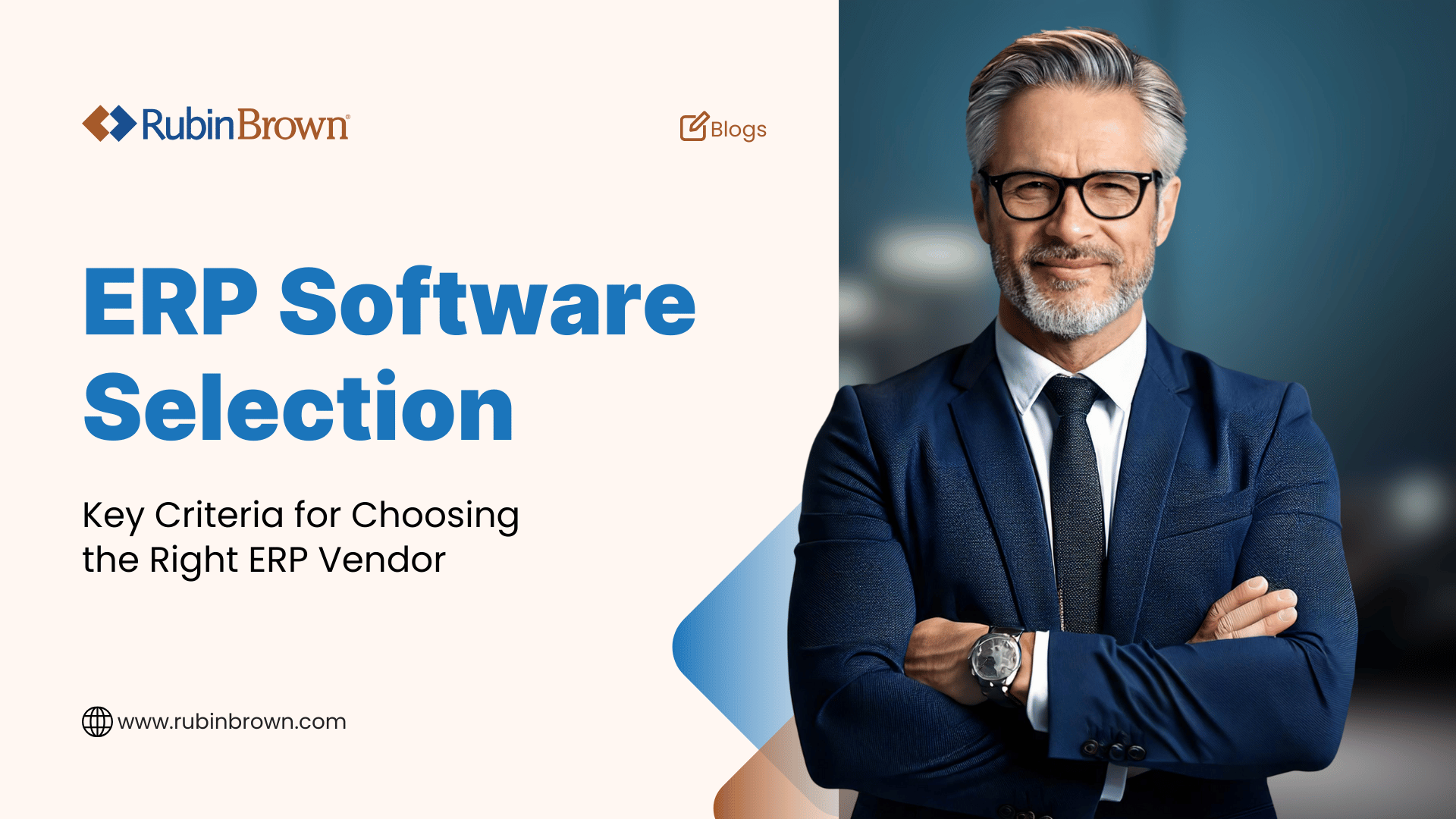ERP Consulting: Why Work With an Independent Consultant
ERP projects are often described as make-or-break, and for good reason. The wrong choice can cost millions and stall growth, while the right one can...
11 min read
Admin
:
Updated on May 9, 2025

One in five ERP implementations fails outright, and over half experience significant delays or budget overruns—often traceable back to one decision: the consultant you choose. While ERP systems promise operational efficiency, they also introduce complexity, cross-functional disruption, and long-term financial commitment. Selecting a consultant who lacks industry alignment or a structured methodology can leave your business with the wrong system—or worse, a failed implementation.
The stakes are too high to treat ERP consultant selection as a routine vendor search. This guide outlines the critical factors to evaluate in a consulting partner—from independence and methodology to industry experience and long-term support. For organizations preparing to modernize their core systems, the right consulting partner makes the difference between a system that delivers measurable value and one that adds cost without performance.
Choosing the right ERP consultant is foundational to the overall success of an ERP project. The impact of your selection decision can be measured in terms of budget adherence, project timelines, and the eventual return on investment. The following factors highlight the importance of this decision:
An ERP implementation project is a significant investment, and picking the wrong consultant can lead to extended timelines, budget overruns, and general frustration. Time and money spent on a misaligned consultant are difficult to recover, especially when the business is left with a suboptimal ERP solution. Engaging an ERP consultant who has verifiable industry experience, proven methods, and a record of successful implementations mitigates common pitfalls and reduces exposure to expensive mistakes.
A strong consultant will develop a clear project plan, highlight major milestones, and manage potential disruptions early on. For instance, if the consultant recognizes that the existing IT infrastructure needs an upgrade to accommodate a new system, they will schedule this step before the primary ERP implementation begins. Advanced planning prevents chaos and helps the ERP project stay within budget and timeline constraints.
An effective ERP consultant integrates your organization’s strategic objectives and business processes into every step of the selection process. Without this alignment, the resulting ERP system may fail to meet your requirements. For instance, if the organization aims to enhance supply chain performance but the selected ERP software has limited supply chain management functionalities, you might struggle to see meaningful returns. A capable consultant ensures any chosen solution focuses on these critical workflows and offers the integration and customization necessary for long-term efficiency.
Consultants also manage stakeholder expectations by clarifying goals at the onset. That can include setting a realistic schedule for design, testing, training, and go-live, with each phase mapped to tangible business outcomes. It is common for ERP projects to evolve from initial concept to final implementation, and an aligned consultant helps you adapt while keeping core objectives top of mind.
ERP systems are a multi-year or even multi-decade investment. Once the system is live, it forms the digital core of the enterprise for day-to-day operations as well as strategic initiatives. Selecting the right consultant helps you get the most out of your new ERP over its lifecycle. The consultant’s guidance often extends well beyond the initial go-live, including helping you identify post-launch enhancements or integration opportunities.
A reputable ERP consulting firm provides ongoing support related to updates, security patches, user training, and optimization. They can recommend new modules, third-party applications, or expansions that align with your growing business needs. This level of partnership ensures you see long-term value from your ERP investment, rather than slipping into inefficiencies or missed opportunities that might arise from inadequate post-launch follow-up.
Choosing an ERP consulting firm is one of the most critical early decisions in your ERP selection project. The right consulting partner will not only help you evaluate ERP solutions but will also guide your organization through process analysis, requirements gathering, vendor assessment, and eventual implementation. These best practices ensure that your selection process is grounded in business value, stakeholder alignment, and practical execution.
The foundation for a successful ERP selection project lies in articulating specific business objectives and ERP requirements. Many organizations begin by mapping current business processes to see where operational gaps exist. This step clarifies the functional aspects of an ERP system that should be prioritized.
Defining objectives might involve specifying how the ERP will handle supply chain optimization, financial reporting automation, or any other critical area. Objectives should be measurable. For example, the organization could aim for a 15% reduction in order-to-cash cycle time within a year after go-live. These parameters guide the entire ERP selection process and help the consultant align recommendations with real outcomes.
An ERP system affects nearly every department, from accounting to sales to human resources. Forming a cross-functional team to oversee the selection project is advisable. This group should include representatives from departments that will rely on the new system. Individuals who understand the daily tasks and the pain points of current processes can better articulate requirements that might not be immediately obvious to upper management.
Involving end-users early on promotes buy-in and reduces pushback later. When employees see their perspectives valued, they tend to be more supportive during training and go-live. An ERP consultant with experience working across large, diverse teams adds organizational stability during these discussions.
Evaluating the background and track record of potential consultants is one of the most important steps. Investigate their industry experience, read case studies, check customer testimonials, and verify references. Certain consultants specialize in specific verticals—manufacturing, healthcare, retail, etc. Matching a consultant’s skill set to your industry sector ensures they can address the unique processes and regulatory requirements your organization faces.
It also helps to see if the consultant is truly independent. Some consultants work closely with certain software vendors, which might inject bias into product recommendations. Others operate as an independent ERP consulting firm, giving you a broader range of potential solutions. Thorough research of references, success stories, and methodology reveals whether they have a proven track record of delivering the outcomes you need.
Planning for user adoption can be the deciding factor for ERP success. Employees might struggle with learning a new interface, adjusting to updated workflows, and shifting responsibilities. An experienced consultant doesn’t just focus on technology; they also emphasize the human side of change.
Key components of change management include clear communication, step-by-step training, and well-documented user guides. When team members understand how the ERP will simplify or improve their work, they are more willing to adapt. A consultant might also propose pilot programs or phased rollouts so that your organization can gather feedback, resolve issues, and refine processes before full deployment.
Business needs evolve over time, so the ideal ERP consultant and software must be able to adapt. This includes offering modular functionality, easy customization, and straightforward integration with third-party systems. A consultant who prioritizes flexible solutions can future-proof your ERP investment by ensuring that expansions or new functionalities can be added as your company grows.
Scalability is equally important. If you plan on expanding into new markets or adding product lines, the chosen ERP should handle the increased transaction volume without slowing down. Discuss with prospective consultants how they approach system scalability, whether that involves cloud-based solutions, load balancing, or other architecture considerations.
Not all ERP consultants bring the same value to the table. Selecting the right partner requires more than checking references—it involves evaluating methodology, industry knowledge, independence, and post-implementation support. Using objective criteria during your consultant evaluation process helps ensure you find a consulting partner who aligns with your goals and can deliver measurable results.
An unbiased consultant helps you find the best ERP software based on your requirements, not on a commission or partnership arrangement. Many organizations discover too late that their chosen consultant has a vested interest in one or two ERP vendors. While such relationships do not necessarily indicate poor quality, they can limit the range of solutions you consider.
Ask prospective consultants about their affiliations and how they are compensated. A consultant who prides themselves on objectivity will highlight the pros and cons of several ERP solutions without steering you toward a single, prearranged answer. This transparency ensures you make decisions on your own terms.
A structured, proven methodology is a core part of successful ERP consulting. Consultants who publish white papers, speak at industry events, or have recognized frameworks often bring deeper insights to the table. Their methodology should cover the entire selection and implementation process, from requirements gathering to testing and post-launch optimization.
Thought leadership is an indicator that the consulting firm invests in ongoing research and stays informed about emerging best practices. It also shows they have formal processes for risk identification, project governance, and continuous improvement. Your internal teams benefit from this knowledge transfer, ultimately strengthening your organization’s in-house capabilities.
Working with a consultant who has completed projects in your industry can save enormous time. An ERP system in automotive manufacturing, for example, has different modules and compliance needs compared to an ERP used by a healthcare provider. Knowledge of sector-specific requirements—such as managing lot traceability in pharmaceuticals—improves the outcome and mitigates oversights.
Cultural fit is also important. The consultant’s working style should align with your corporate culture. If your teams prefer collaborative workshops, a consultant accustomed to remote or siloed processes might cause friction. Conversely, if you need a very hands-on approach from your consultant, confirm that they can dedicate the on-site presence and resources to match that expectation.
Few organizations purchase an ERP system that operates entirely on its own. Most businesses require integration with other software solutions—ranging from e-commerce platforms to specialized inventory management tools. The consultant must have proven integration skills or partnerships to ensure these connections work smoothly.
Customization is another area to verify. Off-the-shelf ERP software might not handle unique or specialized workflows. A consultant with customization expertise can modify the software or recommend third-party extensions to fill these gaps. This approach can be critical for preserving specialized processes that give your company a competitive edge.
ERP selection and implementation is rarely a one-time engagement. Many of the top ERP selection consultants offer ongoing support long after the initial rollout. This includes help desk assistance, user training, system updates, and advice on future enhancements. The best ERP consulting firms recognize that new demands will inevitably surface as your business evolves.
Before signing an agreement, clarify the level of support you’ll receive. Understand if your contact will remain the same or if you’ll transition to a different support team post-implementation. Consistency can make a major difference when urgent matters arise or expansions are planned.
Selecting the right ERP consultant involves asking direct questions that reveal their approach, capabilities, and compatibility with your organization. Below are some of the most critical questions to pose during the evaluation phase.
When interviewing ERP consultants, ask how they build their vendor shortlists and whether financial incentives influence those decisions. Some consultants receive referral fees or maintain reseller agreements that may bias their recommendations. Transparency around compensation—whether hourly, fixed-fee, or commission-based—helps you assess objectivity. A reliable ERP selection consultant will clearly explain their selection process and disclose any vendor relationships so you can make fully informed decisions.
Your ERP consultant should be able to outline each phase of the selection and implementation process, from business requirements to post-go-live support. Ask how they handle timeline adjustments and scope creep, which are common in complex projects. A seasoned consultant will build in contingency plans and proactively address change management, ensuring smoother transitions across departments. Their roadmap should reflect a balance of technical milestones and organizational readiness.
ERP investments extend beyond software licensing, so it’s important to understand the full financial picture. Ask for a detailed breakdown of implementation services, third-party integrations, training, and support fees. Clarify how unexpected costs—such as additional configurations or third-party tools—will be handled. Consultants who offer transparency from the outset help you build a realistic budget and avoid costly surprises.
The implementation methodology a consultant uses will influence project structure, speed, and quality. Ask how their approach is adapted for your industry, and how it supports phased rollouts, testing, and user training. The best ERP consulting firms use a structured, repeatable methodology that includes risk mitigation strategies and stakeholder engagement. Their process should demonstrate how they turn ERP strategy into actionable, successful outcomes.
It’s not enough to meet with the lead consultant—ask who will actually be managing day-to-day tasks on your project. Request background information on each team member, including experience with your industry and relevant ERP platforms. You should also confirm whether domain experts—such as supply chain or finance specialists—will be available when needed. The strength and makeup of the full team often determines the quality of execution.
A reputable ERP consultant should offer references from projects similar in size, scope, and industry. Speak with these clients to understand how well the consultant managed scope, stayed on budget, and supported user adoption. Also, ask about post-implementation support—whether it includes structured training, system updates, or ongoing advisory services. Long-term support ensures your ERP system continues to evolve with your business needs.
While evaluating ERP consultants, it is equally important to recognize warning signs that may indicate potential challenges or misalignments. Red flags often show up early—in sales conversations, vague proposals, or rushed promises—and can foreshadow deeper problems during implementation. Identifying these issues before a contract is signed can prevent delays, cost overruns, and disappointing outcomes.
Some firms enter new verticals without sufficient experience, which increases the likelihood of missed nuances in compliance, data requirements, or process design. Look for documented case studies or past clients in your industry, not just generalized ERP knowledge. Sector-specific insight makes a measurable difference when configuring modules or mapping workflows. Without it, your project may face delays or require costly rework after go-live.
A consultant without a clear, repeatable methodology is likely to take an inconsistent or ad-hoc approach to your ERP selection project. This lack of structure can lead to inefficiencies, unclear responsibilities, and missed deadlines—issues that often result in cost overruns or delayed implementations. A proven methodology ensures that every phase—from requirements gathering to vendor evaluation and system rollout—is executed with discipline and accountability. It also promotes better communication, stakeholder alignment, and risk management throughout the ERP selection and implementation process.
ERP consultants should help you evaluate a broad range of software options, not just push one solution. If a consultant only presents one or two vendors without a comparative analysis, that’s a red flag. True objectivity means considering your business size, industry, and technical needs—not just what they’re most familiar with or incentivized to recommend. A well-rounded selection process ensures the right ERP fit.
A lack of cost transparency or unwillingness to answer detailed questions should raise immediate concerns. Reliable ERP consultants will provide itemized estimates and explain how fees are structured, including any variable costs for custom work or ongoing support. If the consultant struggles to articulate previous project challenges or is slow to respond during early conversations, that may reflect their approach to ongoing collaboration.
Steer away from consultants who promise extremely short timelines or claim that an ERP system can be up and running without any challenges. Implementation is a complex process that almost always involves unexpected learning curves, data cleanup, and user training. Realistic estimates reflect a consultant’s understanding of the complexities involved.
ERP projects require a software consultant with the experience, objectivity, and structure to lead every phase of the selection and enterprise software implementation process. The right ERP consulting partner reduces risk, aligns technology with business strategy, and helps ensure long-term value through effective planning and change management. Success depends on clear goals, a disciplined approach, and a team that understands both your industry and your priorities.
RubinBrown provides independent ERP consulting services tailored to your organization’s needs—with unbiased recommendations and a focus on measurable outcomes. Connect with us to learn how our proven methodology supports successful ERP selection and implementation.

ERP projects are often described as make-or-break, and for good reason. The wrong choice can cost millions and stall growth, while the right one can...

1 min read
Is your ERP system still doing its job? Most companies don’t know until it’s too late. The most expensive mistake in enterprise resource planning...

Selecting an ERP system involves careful evaluation of ERP software and vendors, each with unique capabilities and benefits, as outlined in the ERP...